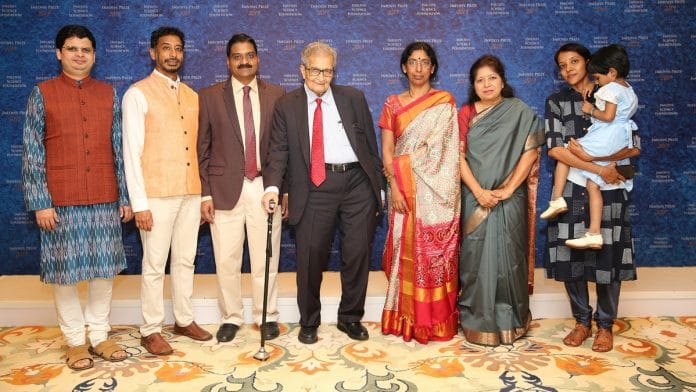Bengaluru: The Infosys Science Foundation awarded the annual Infosys Prize for 2019 in six subjects Tuesday. The winners were selected in the fields of physical sciences, mathematical sciences, life sciences, engineering and computer science, humanities, and social sciences.
The names of winners were announced in November 2019. The prize consists of a gold medal, a citation, and $100,000. A look at the winners in different categories:
Sunita Sarawagi — Engineering and computer science
Sarawagi is the institute chair professor, Computer Science and Engineering at the Indian Institute of Technology (IIT), Bombay. She is known for her work in databases, data mining, machine learning, and natural language processing. She was recognised for her work in information extraction techniques.
Manu Devadevan — Humanities
Devadevan is an assistant professor at the School of Humanities and Social Sciences, IIT-Mandi. He is well known for his study on the cultural history of India, and is recognised for his original and wide-ranging work on pre-modern South India.
Manjula Reddy — Life sciences
Reddy is the chief scientist at the Centre for Cellular and Molecular Biology in Hyderabad. She is widely recognised for her work on the structure of bacteria cell walls, which has important implications for developing a new class of antibiotics.
Siddhartha Mishra — Mathematical sciences
Mishra is a professor at the Department of Mathematics, ETH Zurich. He is known for his work on computational methods that solve non-linear partial differential equations. He is recognised for his contributions to applied mathematics.
Govindasamy Mugesh — Physical sciences
Mugesh is a professor at the Department of Inorganic and Physical Chemistry, Indian Institute of Science, Bengaluru. He has contributed to the field of small molecules by helping understand the role of trace elements, such as selenium and iodine, in thyroid hormone activation and metabolism. He is known for his work on nanomaterials that has led to medical advancements.
Anand Pandian — Social sciences
Pandian is a professor at the Department of Anthropology, Krieger School of Arts & Sciences, Johns Hopkins University. He is well known for his contribution to anthropology and is recognised for his work on ethics, self-hood, and the creative process.
Friendship central to development of knowledge: Amartya Sen
Nobel laureate Amartya Sen was the chief guest at the felicitation ceremony. He spoke about differences in human lives that act as barriers to intellectual progress within and beyond national boundaries.
“Divisions between groups and sects not only damage our social lives, but they can also work as barriers to intellectual progress within and across the nations,” Sen said. “Friendship is, in fact, central to the development of knowledge.”
Sen, a professor of economics at the Harvard University, added: “…The mathematical revolution in India from the fifth century onward, led particularly by Aryabhata, was influenced by intellectual developments in Greece, Babylon and Rome. But Aryabhatian mathematics, in turn, took gigantic leaps in India and then spread abroad with transformational impact in China, the Arab world and eventually Europe.”
Speaking to ThePrint, Mriganka Sur, Newton professor of neuroscience and director at the Simons Center for the Social Brain in Massachusetts Institute of Technology, said, “The process of nomination and selection of winners is extremely meticulous and rigorous.”
A long list is made, Sur added, and each step in the shortlisting process is undertaken with a lot of diligence. The jury members converse via meetings, emails, and phone calls for at least three months and “maintain the caliber of the awarded research”.
Also read: Nandan Nilekani: India’s financial inclusion is on fast track because of these 3 big ideas
Disclosure: Infosys Chairman Nandan Nilekani and Co-founder N.R. Narayana Murthy are among the distinguished founder-investors of ThePrint. Please click here for details on investors.






